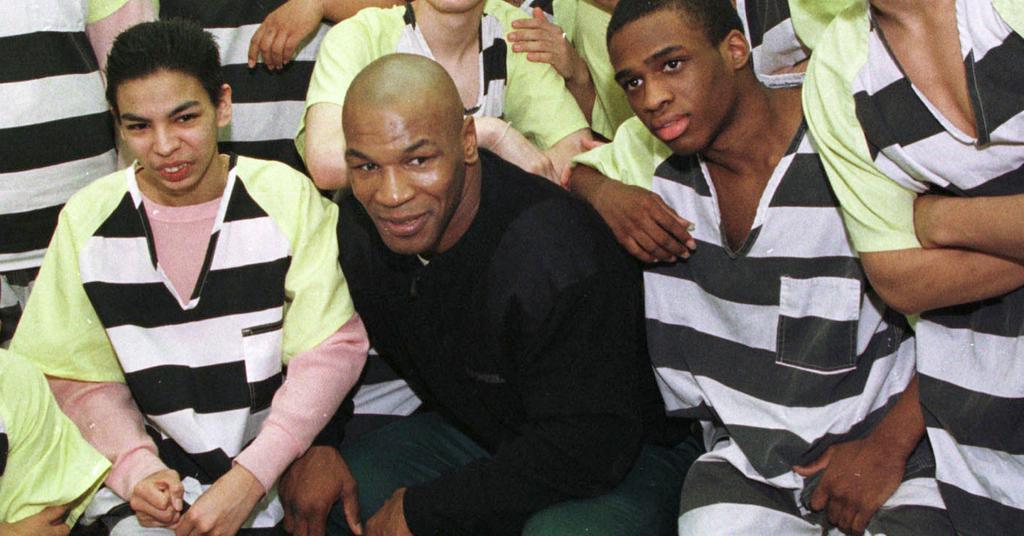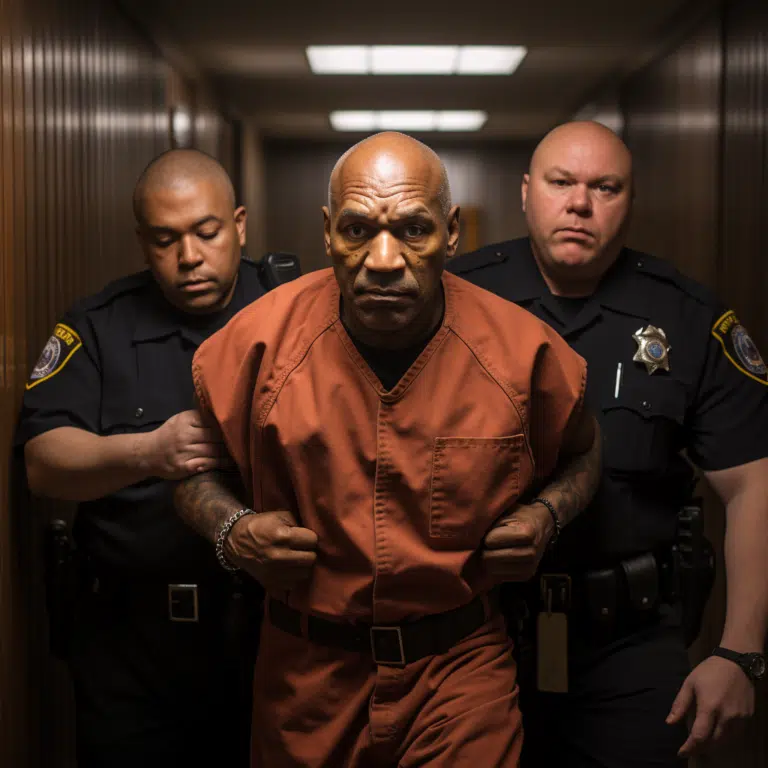Many people wonder about the specifics of someone's time behind bars, especially when a name like "Mike" comes up in conversation. It is a very common question, that, "How long did Mike go to jail?" This kind of query often comes from a place of genuine interest in the legal process, or maybe a wish to understand the consequences of certain actions. People often have a strong desire for information when they hear about someone serving time. A person might really crave to know the full story, wanting to fill in the gaps in their knowledge.
Figuring out exactly how long someone like our hypothetical "Mike" spent in jail or prison is not always a simple thing. There are many parts to the legal system that decide this. It is almost like a puzzle with lots of pieces. The amount of time someone stays locked up depends on a whole bunch of things, from the sort of action they did wrong to the particular laws of the place where it happened. So, you know, it's never just one simple answer.
This article will look at the different things that influence how long a person might be in jail. We will use the name "Mike" as an example to help explain these ideas. Please remember, this "Mike" is a general example for discussion, not a specific person. The information here aims to help you get a better grasp of how jail sentences work. You might find it interesting to see how different elements play a role in the time a person serves, actually.
Table of Contents
- Understanding Mike's Situation: A Hypothetical Look
- What Shapes a Prison Sentence Duration?
- The Impact of Time Behind Bars
- How the Justice System Works with Time
- Common Questions About Jail Time
- Final Thoughts on Understanding Sentences
Understanding Mike's Situation: A Hypothetical Look
When someone asks, "How long did Mike go to jail?", they are often looking for specific details about a real person. However, for our discussion, "Mike" will be a made-up person. This allows us to talk about the general ideas behind jail sentences without getting into anyone's private life. We can still learn a lot about how the system works, you know, even with an example like this. It helps to illustrate points clearly, basically.
Let's imagine our Mike. He is a person who, at some point, faced legal trouble. The exact nature of his actions is not as important as understanding the principles that would decide how much time he spent locked away. The duration of his time inside, whether it was a short period or a very long stretch, would depend on a collection of important factors. These factors are pretty much the same for anyone who goes through the justice system, in fact.
Personal Details and Background of Our Example Mike
For the sake of our discussion, let's give our example Mike a simple, made-up background. This helps us to think about how different life situations might affect a person's legal journey. It's just a way to make the example a little more real for thinking purposes. So, here are some pretend details for our Mike:
| Detail | Description (Hypothetical) |
|---|---|
| Name | Mike Anderson |
| Age at Incident | 32 |
| Occupation | Construction Worker |
| Family Status | Single, with one younger sibling he helps support |
| Prior Record | One minor offense from several years ago (e.g., traffic violation) |
| General Demeanor | Usually quiet, tends to avoid conflict |
These details are purely for illustration. They help us think about how a judge or jury might look at someone's situation. For instance, a person's age or whether they have family responsibilities might, in some ways, play a part in sentencing considerations, though the main focus is always on the specific actions. It's just a way to add a bit of context, you know, to our example.
What Shapes a Prison Sentence Duration?
The question of "How long did Mike go to jail?" really opens up a discussion about how sentences are decided. It is not just a random decision. There are clear rules and common practices that judges follow. The time someone spends inside can be a very long period, or it might be shorter, depending on a variety of things. It is quite a complex system, actually.
Understanding these elements helps us see why two people who did something similar might end up with different amounts of time. It is a bit like looking at different paths someone could take. Each path has its own length, you know, and its own challenges. Let's look at some of the main things that affect how long a person might be in jail or prison.
The Type of Wrongdoing
The most important thing that decides how long Mike went to jail is the kind of action he committed. Different actions have different ranges of punishment set by law. For example, a minor theft will usually carry a much shorter potential sentence than a serious violent act. The law has specific guidelines for nearly every type of offense, apparently.
These guidelines often categorize actions by their seriousness. A very serious action, like one that causes great harm to another person, will almost always lead to a much longer possible time in prison. Less serious actions, perhaps those that do not involve direct harm, usually have shorter maximum sentences. It is all pretty much laid out in legal codes, you see.
Past Actions and Record
If Mike had a history of past actions, especially similar ones, this could make his current sentence longer. Judges often look at a person's entire history when deciding how much time to give. A person who has been in trouble before might get a longer sentence than someone who is facing charges for the first time. This is a common practice, naturally.
The idea here is that a repeated pattern of behavior might suggest a greater need for a longer period of confinement or a stronger deterrent. A clean record, on the other hand, might sometimes lead to a more lenient sentence, particularly for less serious actions. It really just depends on the specific situation and the laws in place, too it's almost.
Plea Agreements and Cooperation
Many legal cases do not go to a full trial. Instead, a person might agree to a plea deal. This means they admit to certain actions in exchange for a lighter sentence or fewer charges. If Mike agreed to a plea deal, his time in jail could have been significantly reduced compared to what he might have received if found guilty at trial. This is a very common way cases are resolved, as a matter of fact.
Cooperation with authorities can also play a big part. If Mike provided help to law enforcement, like giving information about other actions, this could also lead to a shorter sentence. This is often an incentive offered by the prosecution to help solve other cases. It's a strategic move, you know, for both sides.
Good Conduct and Early Release
Even after a sentence is given, the actual time served can change. Most prison systems have provisions for "good conduct" time. This means that if a person behaves well while inside, they can earn days or months off their sentence. This is a way to encourage good behavior and maintain order within the facility. So, a person can earn their way out a little sooner, apparently.
Parole is another way a person might get out before serving their full sentence. A parole board looks at a person's behavior, their plans for after release, and whether they seem ready to rejoin society. If approved, they serve the rest of their sentence under supervision in the community. It's a pretty big step, you see, towards freedom.
Location and Specific Laws
The laws vary greatly from one place to another. What might lead to a five-year sentence in one state could be a two-year sentence in another, or even a ten-year sentence somewhere else. The specific jurisdiction where Mike's actions took place would have a huge impact on how long he went to jail. It's really quite different depending on where you are, you know.
Federal laws are different from state laws, and even within states, there can be local differences in how sentences are applied. Some places have mandatory minimum sentences for certain actions, meaning a judge cannot give a sentence below a certain length, no matter the circumstances. This can make the time served much longer, naturally.
The Impact of Time Behind Bars
The question "How long did Mike go to jail?" is not just about a number. It is also about the effect that time has on a person and those around them. Spending any amount of time in jail or prison changes lives in many ways. It is a very significant experience, one that leaves a lasting mark, to be honest.
The impact stretches far beyond the walls of the institution. It touches the individual, their family, and even the wider community. Understanding this broader effect helps us to grasp the full meaning of a jail sentence. It's not just about punishment; it's about the ripple effects, too it's almost.
On the Individual
For someone like Mike, spending time in jail can mean a significant break from their normal life. They lose their freedom, their job, and often their connections to the outside world. This can be a very hard adjustment. The daily routine inside is very different from life outside, which can be disorienting, you know.
Long periods of confinement can affect a person's mental well-being and their ability to cope with life after release. Rejoining society can be a big challenge, with difficulties finding work or housing. The time spent inside, whether it was a long duration or a short one, shapes a person's future in profound ways, apparently.
On Family and Loved Ones
When Mike went to jail, his family and friends also felt the effects. They might have worried about his safety, missed his presence, and faced financial difficulties. Maintaining connections with someone inside can be tough, involving long visits and limited communication. It is a very heavy burden for families to carry, naturally.
Children especially can suffer when a parent is away for a long time. The family structure changes, and there can be emotional distress. The time Mike spent away created a void, and filling that void is a long process for everyone involved. It really just takes a lot out of everyone, you see.
On Society and Community
The community also feels the effects of someone going to jail. There is the cost of keeping people in prison, which is paid by taxpayers. There is also the loss of a productive member of society, at least for a period. When Mike was in jail, he was not contributing to the economy or his local community in the same way. This has a broader impact, you know.
The goal of the justice system is not just punishment, but also public safety and, ideally, helping people return to society as better citizens. The success of this goal affects the entire community. A person's return after a long time away can be a challenge for everyone, in a way, as they try to fit back in.
How the Justice System Works with Time
Understanding "How long did Mike go to jail?" also means looking at how the legal system measures and manages time. It is a system designed to apply rules consistently, though individual cases always have their own unique aspects. The concept of "time" is central to how punishments are handed out and served. It is a very structured process, apparently.
From the moment a person is charged to their eventual release, time is tracked and accounted for. This includes everything from the initial arrest to the possibility of parole. Let's explore some of these aspects. It's a pretty detailed system, you know, with lots of moving parts.
Sentencing Guidelines
Most jurisdictions have sentencing guidelines. These are rules or recommendations that help judges decide on an appropriate sentence. They take into account the seriousness of the action and the person's past record. These guidelines aim to make sentences fair and consistent across different cases. They help to prevent wildly different outcomes for similar situations, as a matter of fact.
While judges have some flexibility, they usually have to explain if they go outside these guidelines. This means that for our example Mike, the guidelines would have given a starting point for how long he might go to jail. It is a system that tries to bring some order to a very complex process, you see.
Parole and Supervised Release
As mentioned, parole is a way for people to finish their sentence outside of prison, but under supervision. This is not automatic; a person usually has to apply for it and meet certain conditions. The parole board looks at whether the person has shown they are ready to follow rules and live responsibly. This is a big step in a person's journey, naturally.
Supervised release is similar, often part of a federal sentence, where a person is released after serving their prison time but remains under the watch of a probation officer for a set period. Both parole and supervised release mean that even after leaving prison, the person is still, in a way, serving part of their sentence. It is a long process of rejoining the community, you know.
The Long Road to Rejoining the Community
After serving time, whether it was a short period or a very long stretch, the journey to rejoining the community can be challenging. This period is often called reintegration. People like Mike might need help finding a place to live, getting a job, and reconnecting with family and friends. It is a significant transition, you see.
Support programs and community resources play a vital role in this process. They can offer guidance and help with practical needs. The goal is to help people become stable and productive members of society again. This is a long process, one that requires patience and support, to be honest. You can learn more about reintegration challenges on our site.
Common Questions About Jail Time
People often have similar questions when they think about someone's time in jail. These questions often come up because the legal system can seem complicated. We will look at some of these common questions, using our example of Mike to help explain. These are the kinds of things that many people want to know, as a matter of fact.
How does good behavior affect jail time?
Good behavior can indeed shorten the time a person spends in jail or prison. Most correctional systems offer "good time" credits. This means for every day or month a person behaves well, they earn a certain amount of time off their sentence. It is an incentive to follow rules and participate in programs. So, if Mike behaved well, his time inside could have been reduced, you know, by a certain amount.
These credits are not guaranteed; they can be lost if a person breaks rules. The amount of good time that can be earned varies by jurisdiction and the type of sentence. It is a way to encourage order and give people a reason to work towards their release. It's a pretty clear system, apparently, in that regard.
Can a sentence be reduced after it is given?
Yes, a sentence can sometimes be reduced after it is initially given. This can happen in several ways. Good behavior credits, as discussed, are one common method. Another way is through a successful appeal to a higher court, where a judge might decide the original sentence was incorrect or too harsh. This is a possibility, though it is not always easy to achieve, naturally.
Sometimes, new laws or changes in legal policy can also lead to sentence reductions. For example, if a law changes the penalty for a certain action, people already serving time for that action might have their sentences reviewed. It is a complex area of law,



Detail Author:
- Name : Erika Medhurst
- Username : wjones
- Email : lon.wolff@gmail.com
- Birthdate : 1986-08-07
- Address : 10168 Rogahn Mill West Douglas, RI 12208
- Phone : 320.956.5027
- Company : Stiedemann, Nitzsche and Hoppe
- Job : Fiberglass Laminator and Fabricator
- Bio : Similique assumenda molestiae ullam omnis. Cum nihil et omnis consequatur sed. Rerum nulla dolor qui nostrum suscipit repellendus. Nam nobis fugiat ut non nemo.
Socials
tiktok:
- url : https://tiktok.com/@aoberbrunner
- username : aoberbrunner
- bio : Natus et illum veniam quisquam qui veniam ducimus.
- followers : 1819
- following : 1823
instagram:
- url : https://instagram.com/araceli4579
- username : araceli4579
- bio : Id qui ea expedita. Illo praesentium occaecati consectetur quis maxime in.
- followers : 344
- following : 2012
linkedin:
- url : https://linkedin.com/in/araceli_official
- username : araceli_official
- bio : Eligendi necessitatibus dolorem corporis.
- followers : 464
- following : 2272